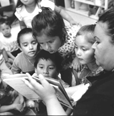Center for the Study of Social Policy
Developed by the Center for the Study of Social Policy in 2001, the Strengthening Families Through Early Care and Education initiative demonstrates how early childhood programs can help prevent child abuse and neglect. The approach builds upon evidence-based protective factors for children and their families by: · Building the approach on the early childhood education system. · Focusing on identifying risks while also building protections for children within their homes and communities. · Seeking to overcome or mitigate manageable individual causes of child neglect and abuse, such as:parental isolation, lack of knowledge about child development, and mental, physical or financial crisis in the family. Quality early care and education programs incorporate program strategies that facilitate friendships and mutual support, strengthen parenting, respond to family crises, link families to service and opportunities, facilitate children's social and emotional development, observe and respond to early warning signs of child abuse and neglect and value and support parents. These program strategies can build the following protective factors which prevent child abuse and neglect: parental resilience, social connections, knowledge of parenting and child development, concrete support in times of need and social and emotional competence of children. (Adapted from information on the website of the Center for the Study of Social Policy, 2004, http://www.cssp.org/,and used with permission of the Center for the Study of Social Policy)
|




















